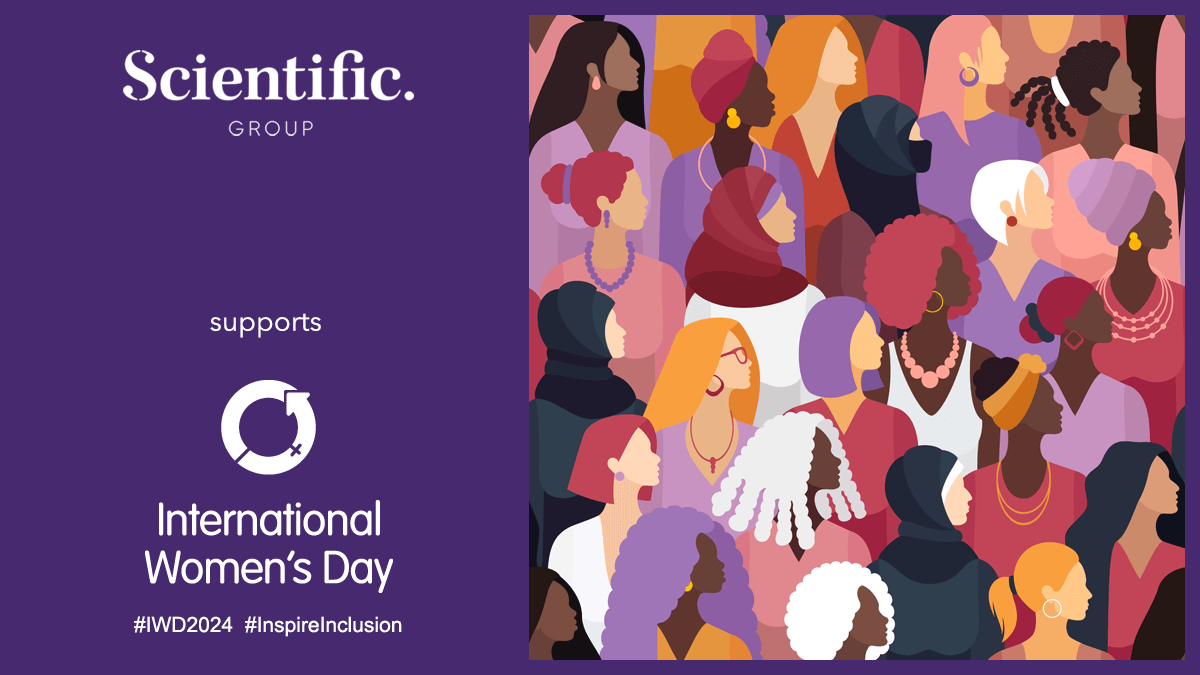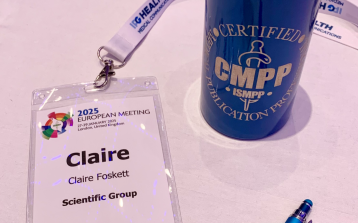We’re celebrating International Women’s Day and the theme for this year is ‘inspiring inclusion’. Here at Scientific Group, we’ve decided to use this opportunity to put a spotlight on menopause.
Menopause* is the timepoint that a woman has stopped menstruating for one year and it often happens between the ages of 45 and 55 years, but symptoms of menopause typically begin at the age of 40.1
Approximately 10% of menopausal women leave their jobs because of their menopausal symptoms.2 About three in five women are negatively affected, for example, by gendered ageism,3 experiencing symptoms that affect their ability to work, or taking sick leave for fear of experiencing symptoms4,5 – which is said to be affecting the UK economy by approximately £7.3m a year in absence-related costs.5
It’s often said that we need to talk (more) about menopause, especially in the workplace. In the med comms sector, a high percentage of our workforce is women, many of whom may be dealing with menopause symptoms or beginning to experience them as part of perimenopause – the first stage of menopause.
Signs and symptoms of menopause to consider
There are many symptoms in menopause that can present differently in each person:6
| Physical |
|
|
| Psychological |
|
|
| Vasomotor |
|
Unfortunately, diagnosis can be delayed, sometimes by up to three years, and a misdiagnosis of depression is common, with many menopausal women being incorrectly treated with antidepressants only.7
Since the majority of our sector is made up of women, it’s also worth noting that, in about 1% of cases, menopause can occur before the age of 40, which is known as premature ovarian insufficiency (POI). This affects approximately 1 in 100 women under the age of 40, 1 in 1,000 women under 30, and 1 in 10,000 women under 20.8
A personal case of coping with menopause when unexpected
I personally fall into the category of entering menopause under the age of 35. My diagnosis of POI was a bit of a shock but after some time I set about becoming an expert patient and joined the Daisy Network. I suddenly began to understand where all those symptoms slowly creeping up on me had come from. For years I had been battling headaches, which I had always simply put down to stress.
I underwent cognitive behavioral therapy to help me adjust the way I think and respond to people and situations. I also scheduled in after work running to help with weight gain, but I struggled with nutritional advice and still constantly crave carbs.
Then came my hormone replacement therapy (HRT) journey. When I finally agreed to take HRT to protect my bone health, it took me a year to find the most suitable one. The worst side effect I remember having was screaming in pain in the middle of the night from joint pain in my hand. After trying out different medications, I got it down to two possible options, and while I benefited from a lot of symptom relief, I struggled to access both drugs (one was discontinued). Luckily after a brief period, the other option became available and has not been affected by supply issues since, though this is still something I worry about.
While I wasn’t someone who struggled with hot flushes, the brain fog and insomnia hit hard, but I found that there were options to mitigate these when speaking to my general practitioner (GP). In a sense, I was even luckier because the third GP I saw had a special interest in menopause, so we were both learning from each other. That would be my key piece of advice to anyone when trying to navigate this – when making that appointment with a GP, request someone who specializes in women’s health or has an interest in menopause.
How is Scientific Group helping to support those with menopause?
Fast forward a few years and I move to a new job at Scientific Group. We signed the Menopause Workplace Pledge in November 2021, the very same year that the program launched.
Our People and Culture department keeps updated information in a centralized location, which includes a helpful symptoms checklist that we can print out and take to our appointments. We have a menopause poster in our shared kitchen with information for all to read. If we are in the office, we have the opportunity to use some slick standing desks, which can help us stave off sedentary behaviors and the cardiovascular risk associated with menopause.
We have the opportunity to work from home and work flexible hours, which helps us subtly deal with symptoms of a personal nature. We do not have to commute on journeys that can exacerbate symptoms of fatigue and we can use the time back to exercise. In fact, we hold fortnightly stretch and tone meetings, and we are currently launching our third walking challenge event, which encourages everyone to be a bit more active! And if we have to attend health appointments such as regular DEXA scans, we have the flexibility to attend them.
Most importantly, we recently trained a few members of staff to be menopause first aiders. Their role involves keeping the conversation going around menopause, sharing knowledge on the topic, and being there for anyone who might need to talk.
We’ve had recent breakthroughs but there is still a way to go
In recent years in the UK, we’ve had Members of Parliament champion and pass the menopause workplace policy, secure menopause education as part of the school curriculum, and campaign for HRT to be free of charge – the last of which came far too late for me but will benefit a large number of women struggling to pay for prescriptions during a cost-of-living crisis.
The government recently debated introducing menopause as a new protected characteristic into the Equality Act 2010, but this was rejected on the basis that existing protected characteristics already provide this protection.9 We still need to educate frontline healthcare professionals on the topic of menopause so that women can receive timely diagnoses and have access to all available treatment.
We have made progress in the menopause sphere with a lot to build on. Hosting informative materials for all members of staff to read and training menopause first aiders to support women in the workplace can offer employees the chance to open up about symptoms they might be experiencing and reduce any isolation they might feel. In the spirit of International Women’s Day, we invite you to sign the Menopause Workplace Pledge (if you haven’t yet) and consider running Menopause First Aid Training, to help support the women in your workforce.
*For the purpose of this article we refer to women, but this includes anyone who experiences menopause symptoms such as transpeople, intersex people, and anyone affected by surgery/drug treatment.
References
- World Health Organization. Menopause. Available at: https://www.who.int/news-room/fact-sheets/detail/menopause. Last accessed Feb 2024.
- NHS employers 2024. Menopause and the workplace. Available at: https://www.nhsemployers.org/articles/menopause-and-workplace. Last accessed Feb 2024.
- UK Parliament. Menopause and the workplace. Inquiry. Available at: https://committees.parliament.uk/work/1416/menopause-and-the-workplace/. Last accessed Feb 2024.
- People Management. Stigma around menopause still exists – but it shouldn’t. Available at: https://www.peoplemanagement.co.uk/voices/comment/stigma-around-menopause. Last accessed Feb 2024.
- Gov.uk. Menopause transition: effects on women’s economic participation. Available at: https://www.gov.uk/government/publications/menopause-transition-effects-on-womens-economic-participation. Last accessed Feb 2024.
- The menopause charity. Symptoms list. Available at: https://www.themenopausecharity.org/wp-content/uploads/2021/05/Symptoms-list.pdf. Last accessed Feb 2024.
- The menopause charity. Common misdiagnoses. Available at: https://www.themenopausecharity.org/2021/10/21/common-misdiagnoses/. Last accessed Feb 2024.
- Daisy Network. What is POI? Available at: https://www.daisynetwork.org/about-poi/what-is-poi/. Last accessed Feb 2024.
- People Management. Is the government right to reject classifying menopause as a protected characteristic? Available at: https://www.peoplemanagement.co.uk/article/1815996/government-right-reject-classifying-menopause-protected-characteristic. Last accessed Feb 2024.





